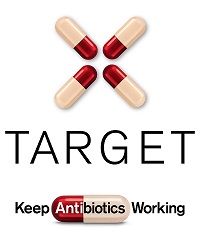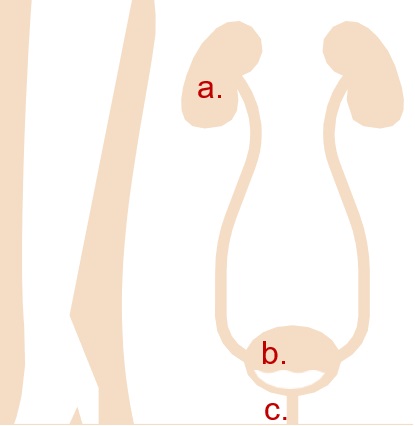Leaflets to discuss with patients
 Using patient
leaflets interactively in consultations is the best way to support effective discussions and maintain patient satisfaction.
Using patient
leaflets interactively in consultations is the best way to support effective discussions and maintain patient satisfaction.
Version 1.0, November 2021.
UTI Leaflet - Combined For Adults
UTI Leaflet - Combined For Adults HTML

Contents
- What is a UTI?
- What can you do to help prevent a urine infection?
- What symptoms should you look out for?
- Always consider COVID-19
- When should you get help?
- What can you do to help feel better?
- Advice about antibiotics
- About this leaflet
What is a UTI?
A urinary tract infection (UTI) occurs when bacteria in any part of the urine system cause symptoms.
Diagnosis is made mainly on your symptoms. Urine dipsticks are only used in women under 65 without catheters.

a. Kidneys make urine
b. Bladder stores urine
c. Urethra takes urine out of the body
What can you do to help prevent a urine infection?
Are you drinking enough? Look at the colour of your urine.

Drink enough fluid (6-8 glasses) so that you pass urine regularly during the day, and to avoid feeling thirsty, especially during hot weather.
Your bladder can be irritated by too much alcohol, fizzy drinks or caffeine.
Prevent constipation; ask for advice if needed.
If diabetic, maintain good control of blood sugar levels.
Stop bacteria spreading from your bowel into your bladder
- Keep the genital area clean and dry; avoid scented soaps
- Change incontinence pads often, and clean genital area if soiled
- Pass urine after having sex
- Women should wash the external vaginal area with water before and after sex, and wipe genitals from front to back after using the toilet
If you have recurrent UTIs
D-mannose or cranberry dietary supplements may help younger women.
What symptoms should you look out for?
COVID-19 specific advice
If you think you may have COVID-19 then please visit GOV.UK's coronavirus section and the NHS for the latest guidance and information.
Speak to NHS111, a pharmacist or your GP if you are worried about COVID-19.
When should you seek more urgent help?
You should consult a health professional if you have UTI symptoms and:
- Your symptoms are getting a lot worse, or not starting to improve within 2 days of starting antibiotics
- You are pregnant, male or post operation
The following symptoms are possible signs of serious infection and should be assessed urgently.
- Shivering, chills and muscle pain
- Not passing urine all day
- Trouble breathing
- Visible blood in your urine
- Feeling very confused, drowsy or slurred speech
- Temperature is above 38ºC* or less than 36ºC
- Kidney pain in your back just under the ribs
- Very cold skin
Contact for help
Contact your GP practice, or:
- NHS 111 England
- NHS 111 Wales
- NHS 24 Scotland
- HSA Public Health Agency (Northern Ireland) for your GP practice
What can be done to make you feel better?
What can you do?
- Drink enough fluid so that you pass urine regularly during the day, especially during hot weather
- Take paracetamol regularly, up to 4 times daily to relieve pain
- There is currently no evidence to support taking cranberry products or cystitis sachets to treat UTIs
What might your pharmacist / nurse / doctor do?
- Give self-care advice and advise pain relief (paracetamol or Ibuprofen)
- Ask you for a urine sample to test
- You may be given an antibiotic immediately, or to use if your symptoms don’t improve or you start to feel worse
- You may be referred to another healthcare provider
If you have recurrent UTIs and self-care options do not help
- Antibiotics at night or after sex may be prescribed
- Vaginal hormone treatments may help some post menopausal women
Advice about antibiotics
- Antibiotics can be life saving for serious urine infections, but antibiotics are not always needed for all urinary symptoms
- Antibiotics may make the bacteria in your bowel resistant to antibiotics making UTIs difficult to treat in the future
- Common side effects of taking antibiotics include thrush, rashes, vomiting and diarrhoea; ask for advice if you are worried
- Keep antibiotics working, only take them when your healthcare professional advises them
About this leaflet
TARGET is operated by the UK Health Security Agency. Developed in collaboration with professional medical bodies.
Version: 1.1
Published: March 2021
Revision: March 2023